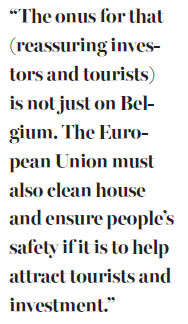Back to normal, but still much to do
Updated: 2016-04-15 08:53
By Fu Jing(China Daily Europe)
|
|||||||||
After the terrorist attacks, Brussels and the EU must work to reassure Chinese investors that Europe is safe
When I got out of a taxi and rolled my suitcase into Brussels-South railway station to get a train to London on April 7, two heavily armed soldiers patrolling the concourse looked me up and down, their hands resting on guns.
After the March 22 terror attacks in Brussels, I had thought I'd have to pass through security checks for luggage before entering the gate of the station. But I found this was not the case.
The check-in and border control procedures were the same as my previous trips from Brussels to London. The only obvious difference was that soldiers and security guards were more evident in the arrival and departure halls. And they were fully alert.

Three weeks on from the terrorist attacks at Brussels Airport and a city subway station, life and business activities in this European capital have gradually returned to normal. The damaged airport reopened recently.
Security checks on luggage at the entrance to departure halls have been introduced at Brussels Airport since it reopened, but it is still unknown whether this is temporary or not. And people can enter subway and train stations and shopping malls freely without passing through security checks.
Brussels lowered its security alert three days after the blasts that killed 32 people, including one Chinese, although well-armed soldiers and police can be seen patrolling the city center.
Calling it the worst attack on the country's soil since World War II, Belgian authorities fully know how serious and challenging the situation is. Like the French, the Belgians have learned a costly lesson.
It is daunting that nearly all of the embassies in Brussels and Paris have warned tourists and investors from their countries to be cautious when making decisions to visit France and Belgium.
Some Chinese researchers have begun to look into how the security situation in Europe will affect bilateral business activities. Preliminary figures may offer some relief. During the first three months of this year, the number of Chinese tourists in France dropped 7 percent year-on-year. Yet China's investment in France has still shown a steady increase.

Very likely it is the same with Belgium: More tourists will cancel their trips, but business activities will not be affected too much.
Within a week of the Brussels attacks, a Chinese businessman told me that he still plans to buy a big office property in downtown Brussels. He forecasts that prices will drop 10 to 20 percent on average in Brussels in the coming months.
A Chinese businesswoman I spoke with is also seeking to invest in a Belgian brewery, while a long-time Chinese investor in Brussels plans to organize an investment seminar to show his confidence in Belgium.
I believe there are many more such cases due to Belgium's geographic and geopolitical attractions.
Reassuring investors is an urgent task for Belgian Prime Minister Charles Michel.
He canceled a scheduled trip to China when the attacks happened the day before he was due to fly. Of course, it would be rational for him to make the trip once the situation in his country is under control. This time, his mission will be convincing Chinese investors and tourists that similar attacks will not happen again.
The onus for that is not just on Belgium. The European Union must also clean house and ensure people's safety if it is to help attract tourists and investment.
Belgian and European authorities must convince the world that EU countries are safe.
The author is deputy editor of China Daily European Edition.
Contact the writer at fujing@chinadaily.com.cn
Today's Top News
Inspectors to cover all of military
Britons embrace 'Super Thursday' elections
Campaign spreads Chinese cooking in the UK
Trump to aim all guns at Hillary Clinton
Labour set to take London after bitter campaign
Labour candidate favourite for London mayor
Fossil footprints bring dinosaurs to life
Buffett optimistic on China's economic transition
Hot Topics
Lunar probe , China growth forecasts, Emission rules get tougher, China seen through 'colored lens', International board,
Editor's Picks

|

|

|

|

|

|







